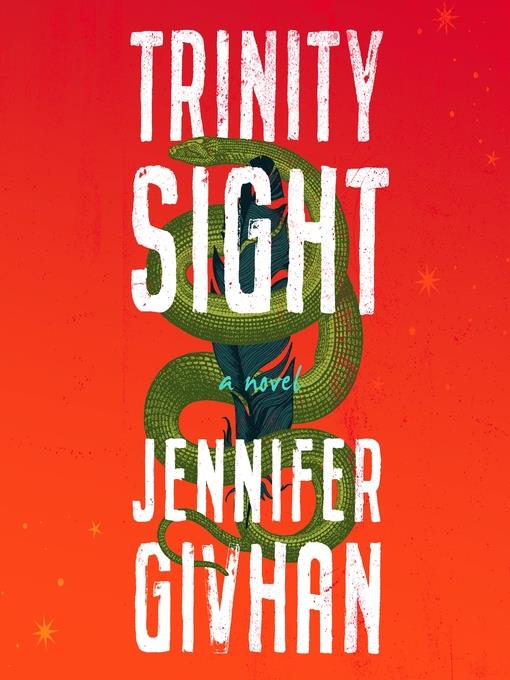
Trinity Sight
A Novel
کتاب های مرتبط
- اطلاعات
- نقد و بررسی
- دیدگاه کاربران
نقد و بررسی

August 1, 2019
DEBUT Poet Givhan blends Puebloan, Zuni, and Mexican American cultures in this searing postapocalyptic rumination on motherhood, genocide, and environmentalism. After a horrible car crash caused by a blinding red light, anthropologist Calliope Santiago regains consciousness in a New Mexico she doesn't recognize, filled with preternaturally violent humans, volcanic eruptions, and chaos following the disappearance of thousands of people. The pregnant (with twins) heroine joins forces with her next-door neighbor, a seven-year-old Korean American with the Sight; Calliope's aunt's partner; an adventurous white college student; and an attractive Zuni-Mexican American man sent to guide her and find her missing husband and son. This magical realist tale reveres the power of nature, exploring what could happen if Earth punished humankind for the atrocities committed against it. Poetry imbues every page with power and truth, and the intense plot is propelled by fully realized characters and a majestically primal setting. VERDICT This harrowing debut with Southwestern sensibility depicts the dangers of destroying our planet and questions whether mythology is an apt term to describe Indigenous beliefs. Purchase where Rebecca Roanhorse's Trail of Lightning and Silvia Moreno-Garcia's Gods of Jade and Shadow are popular. [See Editors' Picks, "Fall Fireworks," p. 25.]--Shelley M. Diaz, BookOps, NYPL & BPL
Copyright 2019 Library Journal, LLC Used with permission.

August 1, 2019
Brace yourself: The end of the world is coming. Or is it? A multilayered, Indigenous-inflected version of the apocalypse that resists predictability. Calliope Santiago is an anthropologist and a young mother heavily pregnant with twins the day the Earth changes forever. As she's driving home from her job as a professor at the University of New Mexico, there's a blinding flash, and Calliope crashes her car. When she comes to, everyone else is gone, rapture-style. Well, almost everyone--Calliope's 6-year-old neighbor, Eunjoo, also remains, inexplicably. The two flee Albuquerque, where long-dormant volcanoes, newly awakened, are burying the city in molten lava, and head for Calliope's aunt's hacienda in the Gila Mountains to the south. On the way, Calliope and Eunjoo amass an unlikely crew of fellow left-behinds, each with his or her role to play as their odyssey unfolds. The author of several poetry collections, first-time novelist Givhan employs Southwestern Puebloan mythology to inform the plot--as when Kachina dolls come to life as the monstrous and deadly Suuke, half-gods, half-monsters hell-bent on destroying Calliope and her companions. Givhan also makes contemporary connections, as when she invokes Kennewick Man, the ancient skeleton discovered in Washington state in the 1990s, and refers to the years of controversy between scientists, the U.S. government, and Native American tribes before the remains were eventually repatriated. Another character, Mara, who's the partner of Calliope's missing aunt, witnessed the birth of the atomic bomb in the 1940s when her father was sent to Los Alamos to work on the top-secret Manhattan project. Mara often links the nuclear terror of her childhood and the rending they're witnessing near the end of her life. Givhan's themes are complex and occasionally compete with the twists and turns of the plot for a reader's attention. Still, texture and nuance are rare among disaster narratives and are welcome here. A testament to the strength of women and girls with a side of philosophy, myth, and metaphysics.
COPYRIGHT(2019) Kirkus Reviews, ALL RIGHTS RESERVED.

January Lavoy narrates a powerful dystopian saga that merges science and religion. After a bright flash, Calliope Santiago is one of only a handful of survivors in a seemingly postapocalyptic wasteland. LaVoy perfectly captures the terrible cascade of emotions Calliope experiences when she realizes that her family is gone--but she must survive because she is pregnant with twins. LaVoy wholly embodies the agonizing despair experienced by several characters, her voice breaking as surely as their hearts are but in no way making the scenes feel contrived. LaVoy's meticulous attention to detail shows in the care with which she voices all of the survivors Calliope surrounds herself with, each a different age and ethnicity, most with terrible psychological burdens, but all fiercely determined to persist. K.M.P. Winner of AudioFile Earphones Award � AudioFile 2020, Portland, Maine

Starred review from August 1, 2019
Mexican American anthropologist Calliope Santiago, heavily pregnant with twins, is driving home from work when she sees a brilliant flash of light and crashes her car. She and the babies are not hurt, and the car has only minor damage, but Calliope's sense that something is wrong is ratcheted up. The cars on the road are empty, her cell phone doesn't work, and neither does the radio. When she arrives home, she finds her house empty; her husband and her young son are nowhere to be seen. Her neighborhood is just as abandoned. The only person she encounters is six-year-old Eunjoo, her next-door neighbor's child. Calliope takes Eunjoo and ventures to her aunt's house further south. On this journey, Calliope experiences events that cannot be explained by science and remind her of stories her great-grandmother told her. Calliope faces great danger in her search for her family while reckoning with science, faith, and stories. Poet Givhan's first novel is a unique take on dystopian fiction, weaving the culture of Pueblo peoples into an adventurous, apocalyptic page-turner. Lyrical writing and exceptional plotting make this #OwnVoices novel highly recommended for all fiction collections.(Reprinted with permission of Booklist, copyright 2019, American Library Association.)

























دیدگاه کاربران